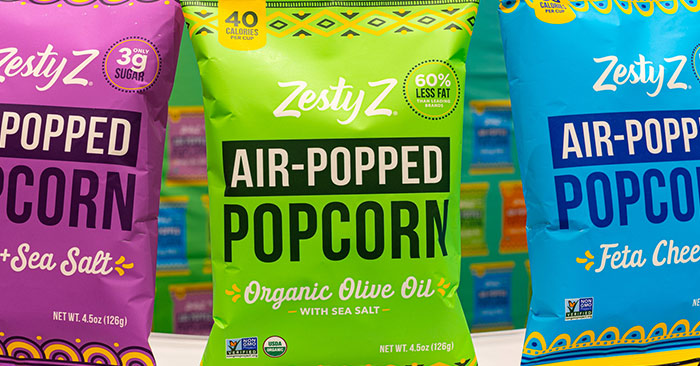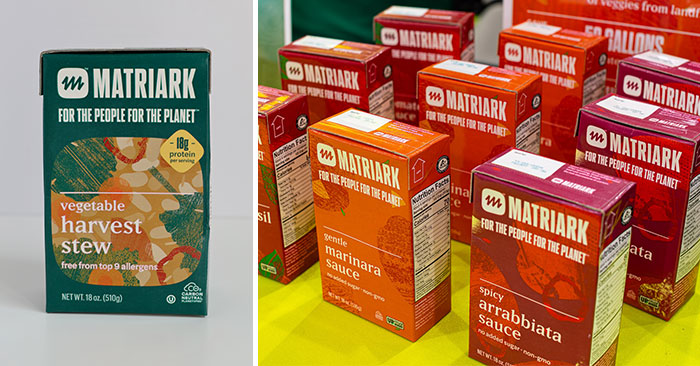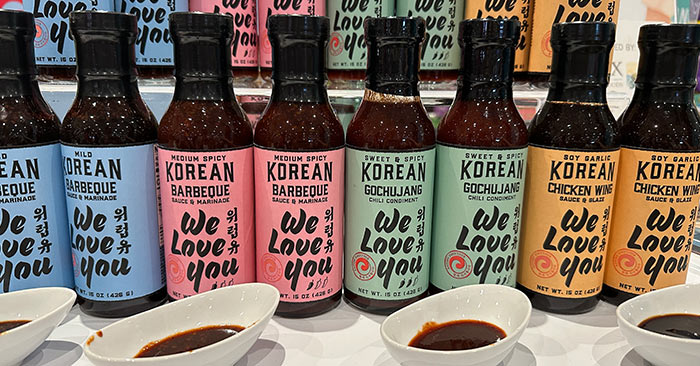Summer Fancy Food Show: Zesty Z Focuses on Snacking; RIND Rebrand

Zesty Z Highlights Its Pivot To Snacking
Zesty Z may have started in condiments and spices, but the Mediterranean-inspired brand’s future largely lies in other categories, founder and CEO Alexander Harik told NOSH at Fancy Food.
The brand highlighted its newest flavor of popcorn, Organic Olive Oil, at the annual summer trade show, its better-for-you stand in for classic buttered popcorn. The new flavor rounds out Zesty Z’s other popcorn SKUs, Harik said, which include Feta Cheese, Spicy Chilli and Honey and Sea Salt, the latter of which launched last year. Packaging now features a bigger call out for “air popped,” a reference Harik believes indicates to consumers a lower calorie count.
While Zesty Z will continue to sell its flagship Za’atar spice mix, that product will largely be for D2C sales and foodservice. Beyond snacks, frozen and refrigerated products are also under consideration for future innovations.
Despite a currently limited retail presence (Harik declined to give numbers), he believes snacks have the potential to rapidly grow that door count. The brand can also save on marketing, he said, because the popcorn’s flavor combinations and familiar use case reduces the need for product education and content creation.
“The brand has always been about Mediterranean flavors, Za’atar was what we just first started with. But how you start isn’t how you finish,” Harik said from the show floor. “There’s a tremendous opportunity to bring Mediterranean-ish flavors to people in more ways … And you look at other brands, whether it’s Asian or Latin American, Hispanic, that have done that, why can’t we?”

Matriark Sees Opportunities Selling to Food Banks
Upcycled pasta sauce producer Matriark Foods has a growing retail footprint – but that’s not whom its newest product is meant for.
Launched last week, the company’s introduced a shelf-stable vegetable harvest stew
designed to be sold into emergency food assistance programs, food banks, and other government supported organizations. Last week the Food Bank of Western New York received the first 12 pallets of the stew, which sells for roughly $3.50, less than half the price of the brand’s sauces.
Made with sweet potatoes, carrots, navy beans, kale, and rice, the stew can be eaten heated or at room temperature, CEO and founder Anna Hammond said, and was developed with support from multinational corporation Danone. Like Matriark’s retail products, many of the ingredients in the stew are upcycled, with beans or vegetables that may have been discarded due to imperfections. The meal contains 530 calories, 12 grams of fiber and 18 grams of protein — a far better nutritional profile, Hammond noted, than some/many other processed foods distributed to food insecure populations.
“There are millions of people in this country who do not have enough food to eat and one in four of those people are children,” Hammond said. “We’re trying to create a better circular economy in the food system, period. [We can] show that nutritious food can be made from surplus, create extra revenue streams for farmers, and [also] feed people in need.”
RIND Rebrands Sliced Vegan Cheeses
After launching in 2022, RIND showcased new flavors and branding at the show for its veggie-based sliced cheeses, now marketed under the name Veggie Underground.
While RIND will continue to market artisanal cheeses under its original name, Veggie Underground is designed to attract a more conventional shopper that is not looking for a cultured cheese product. Per co-founder Dina DiCenso, the company is looking to put its own spin on the product, utilizing vegetable purees with coconut oil and potato starch rather than the sugar, powders and artificial colors that other alt-cheese brands have turned to. Having proven the concept with its original carrot-based cheese slices, two new flavors – red pepper and parsnip – are being rolled out now. A shredded product and cream cheese are also in the works, DiCenso said.
“It’s sort of like being a luxury brand that has some mass market products as well, that are more of the bread-and -butter,” co-founder Joshua Katcher (who also owns a vegan fashion brand) said, comparing the split to the fact that many luxury fashion brands don’t make their money off of high-end clothing. “They make it on fragrance.”

We Love You Says Success Lies with Bifurcated Product Platform
One year after introducing a lower priced version of its Korean condiments, We Love You (formerly We Rub You) is starting to slowly see results, highlighted by getting picked up by Stop & Shop earlier this Spring.
At $5.99 per bottle, $2 less than its original sauces, the differences between the two lines (aside from a pastel vs neon color palette) are hard to spot. However, while both sport the same brand name and general descriptors, the less expensive version does not have non-GMO certification and contains slightly different ingredients.
The brand is slightly low key about the value line, only selling the original SKUs on its website. But it has already helped open new retail accounts, co-founder Ann Chung said.
“Obviously inflation is such an issue. And we thought, what can we do to kind of stay relevant and address something that affects basically everyone?” she said. “So we wanted to launch a value line that basically is the same clean ingredient list, all natural, authentic and still based on a family recipe.”

















